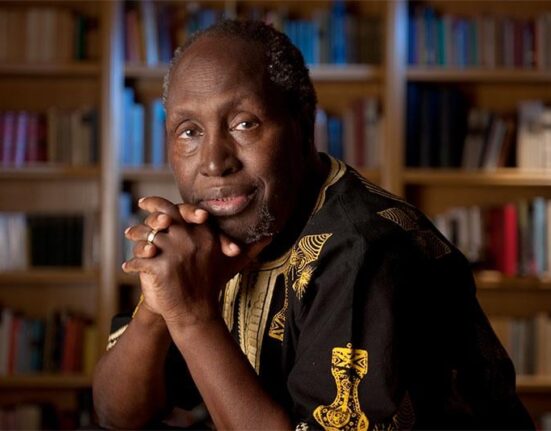Ngugi wa Thiong’o, born James Ngugi on January 5, 1938, was a literary giant hailing from Kenya, renowned for his profound impact on African literature. His works, spanning novels, plays, and essays, delved into the complexities of colonialism, postcolonialism, and the African experience, resonating with audiences worldwide. Let’s journey through the life and legacy of this literary icon who left an indelible mark on the literary landscape.
Ngugi wa Thiong’o’s upbringing in Kamiriithu, Kenya, shaped his perspective and fueled his passion for storytelling. Coming from a large family, he navigated his early years in a vibrant community rich with traditions and narratives that would later influence his literary endeavors. Educated at mission schools and later at Makerere University College in Uganda and the University of Leeds in England, Ngugi’s academic journey laid the foundation for his literary pursuits.
In a bold statement against colonial influences, Ngugi wa Thiong’o reclaimed his identity by changing his name from James Ngugi to Ngugi wa Thiong’o, embracing a traditional Kenyan Kikuyu name. This act symbolized his commitment to decolonizing minds and narratives, a theme that permeated his works and activism throughout his life.
The emergence of Ngugi wa Thiong’o onto the literary stage was marked by the performance of his play “The Black Hermit” in 1962, a groundbreaking moment that heralded his literary prowess. Subsequent works like “Weep Not, Child” (1964) and “The River Between” (1965) further solidified his reputation as a formidable voice in African literature. Through his narratives, he artfully explored themes of colonialism, the Mau Mau Uprising, and Kenya’s quest for independence, offering poignant reflections on the nation’s tumultuous history.
Ngugi’s literary repertoire extended beyond historical narratives, delving into post-independence challenges faced by Kenyans and advocating for decolonization in all aspects of society. His commitment to writing in his native Kikuyu language underscored his belief in the importance of preserving African languages and cultural heritage in the literary realm, a stance that set him apart as a champion of linguistic diversity.
Amid his literary pursuits, Ngugi wa Thiong’o’s unwavering political activism led to his imprisonment in Kenya due to his outspoken criticism of the regime. Forced into exile, first in England and later in the United States, he continued to amplify his voice against colonial oppression and advocate for African self-determination. Despite the challenges and personal sacrifices, Ngugi remained steadfast in his commitment to speaking truth to power through his writings and actions.
Ngugi’s literary legacy is immortalized in works like “A Grain of Wheat” (1967), “Petals of Blood” (1977), “Devil on the Cross” (1982), and “Wizard of the Crow” (2006), each a testament to his storytelling prowess and unwavering dedication to shedding light on societal injustices. His seminal work, “Decolonizing the Mind: The Politics of Language in African Literature” (1986), stands as a manifesto for cultural liberation and linguistic empowerment, inspiring generations of writers and scholars.
“The Upright Revolution: Or Why Humans Walk Upright” (2019), a captivating short story by Ngugi, holds the distinction of being the most translated short story in African literary history, with over 100 translations. This remarkable feat speaks to the universal appeal and enduring relevance of Ngugi’s narratives, transcending borders and languages to touch hearts and minds around the globe.
As news of Ngugi wa Thiong’o’s passing reverberates through the literary world, tributes pour in from admirers, scholars, and fellow writers, honoring his profound contributions to African literature and cultural heritage. His legacy serves as a beacon of inspiration for future generations, reminding us of the power of storytelling to challenge inequities, preserve histories, and ignite movements for social change.
In reflecting on Ngugi wa Thiong’o’s life and works, we are reminded of the enduring impact of artists who dare to confront injustice, celebrate resilience, and amplify marginalized voices. His journey from Kamiriithu to global acclaim stands as a testament to the transformative power of storytelling and the indomitable spirit of those who dare to dream of a more just and equitable world.
As we bid farewell to Ngugi wa Thiong’o, his words echo eternally, urging us to continue the struggle for dignity, equality, and liberation through the transformative power of literature and collective action. May his legacy endure as a guiding light for generations to come, inspiring us to write, speak, and resist in the face of adversity, just as he did with unwavering courage and unyielding compassion.









Leave feedback about this